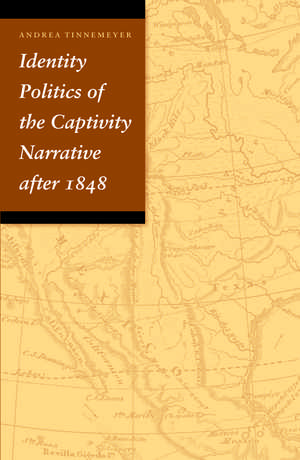Identity Politics of the Captivity Narrative after 1848
Autor Andrea Tinnemeyeren Limba Engleză Paperback – dec 2008
Andrea Tinnemeyer's book examines the nineteenth-century captivity narrative as a dynamic, complex genre that provided an ample medium for cultural critique, a revision of race relations, and a means of elucidating the U.S.–Mexican War’s complex and often contradictory significance in the national imagination.
The captivity narrative, as Tinnemeyer shows, addressed questions arising from the incorporation of residents in the newly annexed territory. This genre transformed its heroine from the quintessential white virgin into the Mexican maiden in order to quell anxieties over miscegenation, condone acts furthering Manifest Density, or otherwise romanticize the land-grabbing nature of the war and of the opportunists who traveled to the Southwest after 1848. Some of these narratives condone and even welcome interracial marriages between Mexican women and Anglo-American men.
By understanding marriage for love as an expression of free will or as a declaration of independence, texts containing interracial marriages or romanticizing the U.S.–Mexican War could politicize the nuptials and present the Anglo-American husband as a hero and rescuer. This romanticizing of annexation and cross-border marriages tended to feminize Mexico, making the country appear captive and in need of American rescue and influencing the understanding of “foreign” and “domestic” by relocating geographic and racial boundaries.
In addition to examining more conventional notions of captivity, Tinnemeyer’s book uses war song lyrics and legal cases to argue that “captivity” is a multivalenced term encompassing desire, identity formation, and variable definitions of citizenship.
By understanding marriage for love as an expression of free will or as a declaration of independence, texts containing interracial marriages or romanticizing the U.S.–Mexican War could politicize the nuptials and present the Anglo-American husband as a hero and rescuer. This romanticizing of annexation and cross-border marriages tended to feminize Mexico, making the country appear captive and in need of American rescue and influencing the understanding of “foreign” and “domestic” by relocating geographic and racial boundaries.
In addition to examining more conventional notions of captivity, Tinnemeyer’s book uses war song lyrics and legal cases to argue that “captivity” is a multivalenced term encompassing desire, identity formation, and variable definitions of citizenship.
Preț: 144.23 lei
Nou
Puncte Express: 216
Preț estimativ în valută:
27.60€ • 28.89$ • 22.84£
27.60€ • 28.89$ • 22.84£
Carte tipărită la comandă
Livrare economică 05-19 aprilie
Preluare comenzi: 021 569.72.76
Specificații
ISBN-13: 9780803220676
ISBN-10: 0803220677
Pagini: 160
Dimensiuni: 152 x 229 x 15 mm
Greutate: 0.28 kg
Editura: Nebraska Paperback
Colecția University of Nebraska Press
Locul publicării:United States
ISBN-10: 0803220677
Pagini: 160
Dimensiuni: 152 x 229 x 15 mm
Greutate: 0.28 kg
Editura: Nebraska Paperback
Colecția University of Nebraska Press
Locul publicării:United States
Notă biografică
Andrea Tinnemeyer teaches English, Chicano literature, and nineteenth-century American literature at College Preparatory School in Berkeley, California. She received her PhD from Rice University and was recently an assistant professor at Utah State University.
Recenzii
“The book’s great strengths are its close readings of understudied materials pertaining to an understudied topic. . . . Tinnemeyer makes a valuable contribution to the field with perceptive analyses and creative archival work. . . . [She] has brought together an exciting group of texts, admirably parsing them from her readers.”—Western American Literature














